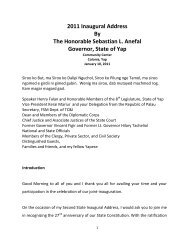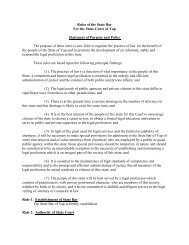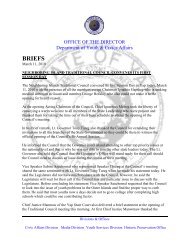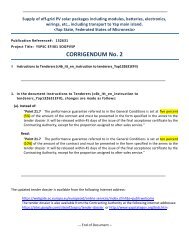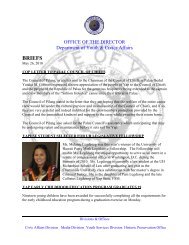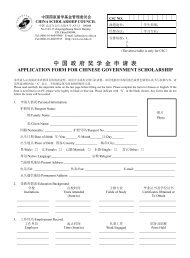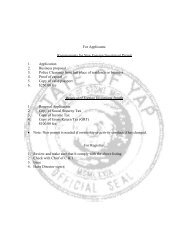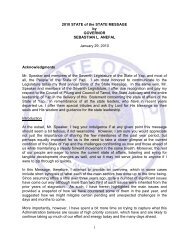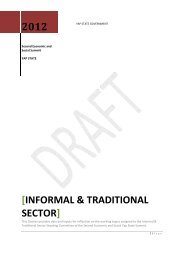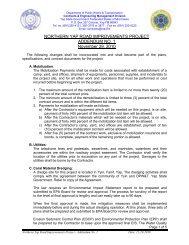RULES OF CIVIL PROCEDURE For the Trial Division of the Yap ...
RULES OF CIVIL PROCEDURE For the Trial Division of the Yap ...
RULES OF CIVIL PROCEDURE For the Trial Division of the Yap ...
You also want an ePaper? Increase the reach of your titles
YUMPU automatically turns print PDFs into web optimized ePapers that Google loves.
Comment: Rule 18 (a) and (b) have been modified slightly in order to ease<br />
comprehension.<br />
Rule 19. Joinder <strong>of</strong> Persons Needed for Just Adjudication.<br />
(a) Persons to be Joined if Feasible. A person who is subject to service <strong>of</strong> process<br />
and whose joinder will not deprive <strong>the</strong> court <strong>of</strong> jurisdiction over <strong>the</strong> subject matter <strong>of</strong> <strong>the</strong><br />
action shall be joined as a party in <strong>the</strong> action if (1) in his absence complete relief cannot<br />
be accorded among those already parties, or (2) he claims an interest relating to <strong>the</strong><br />
subject <strong>of</strong> <strong>the</strong> action and is so situated that <strong>the</strong> disposition <strong>of</strong> <strong>the</strong> action in his absence<br />
may (A) as a practical matter impair or impede his ability to protect that interest or (B)<br />
leave any <strong>of</strong> <strong>the</strong> persons already parties subject to a substantial risk <strong>of</strong> incurring double,<br />
multiple, or o<strong>the</strong>rwise inconsistent obligations by reason <strong>of</strong> his claimed interest. If he has<br />
not been so joined, <strong>the</strong> court shall order that he be made a party. If he should join as a<br />
plaintiff but refuses to do so, he may be made a defendant, or, in a proper case, an<br />
involuntary plaintiff. If <strong>the</strong> joined party objects to venue and his joinder would render <strong>the</strong><br />
venue <strong>of</strong> <strong>the</strong> action improper, he shall be dismissed from <strong>the</strong> action.<br />
(b) Determination by Court Whenever Joinder not Feasible. If a person as described<br />
in subdivision (a)(1)-(2) here<strong>of</strong> cannot be made a party, <strong>the</strong> court shall determine whe<strong>the</strong>r<br />
in equity and good conscience <strong>the</strong> action should proceed among <strong>the</strong> parties before it, or<br />
should be dismissed, <strong>the</strong> absent person being thus regarded as indispensable. The factors<br />
to be considered by <strong>the</strong> court include: first, to what extent a judgment rendered in <strong>the</strong><br />
person's absence might be prejudicial to him or those already parties; second, <strong>the</strong> extent<br />
to which, by protective provisions in <strong>the</strong> judgment, by <strong>the</strong> shaping <strong>of</strong> relief, or o<strong>the</strong>r<br />
measures, <strong>the</strong> prejudice can be lessened or avoided; third, whe<strong>the</strong>r a judgment rendered<br />
in <strong>the</strong> person's absence will be adequate; fourth, whe<strong>the</strong>r <strong>the</strong> plaintiff will have an<br />
adequate remedy if <strong>the</strong> action is dismissed for nonjoinder.<br />
(c) Pleading Reasons for Nonjoinder. A pleading asserting a claim for relief shall<br />
state <strong>the</strong> names, if known to <strong>the</strong> pleader, <strong>of</strong> any persons as described in subdivision<br />
(a)(1)-(2) here<strong>of</strong> who are not joined, and <strong>the</strong> reasons why <strong>the</strong>y are not joined.<br />
(d) Exception <strong>of</strong> Crass Actions. This rule is subject to <strong>the</strong> provisions <strong>of</strong> Rule 23.<br />
Rule 20. Permissive Joinder <strong>of</strong> Parties.<br />
(a) Permissive Joinder. All persons may join in one action as plaintiffs if <strong>the</strong>y assert<br />
any right to relief jointly, severally, or in <strong>the</strong> alternative in respect <strong>of</strong> or arising out <strong>of</strong> <strong>the</strong><br />
same transaction, occurrence, or series <strong>of</strong> transactions or occurrences and if any question<br />
<strong>of</strong> law or fact common to all <strong>the</strong>se persons will arise in <strong>the</strong> action. All persons may be<br />
joined in one action as defendants if <strong>the</strong>re is asserted against <strong>the</strong>m jointly, severally, or in<br />
<strong>the</strong> alternative, any right to relief in respect <strong>of</strong> or arising out <strong>of</strong> <strong>the</strong> same transaction,<br />
occurrence, or series <strong>of</strong> transactions or occurrences and if any question <strong>of</strong> law or fact<br />
common to all defendants will arise in <strong>the</strong> action. A plaintiff or defendant need not be<br />
interested in obtaining or defending against all <strong>the</strong> relief demanded. Judgment may be



